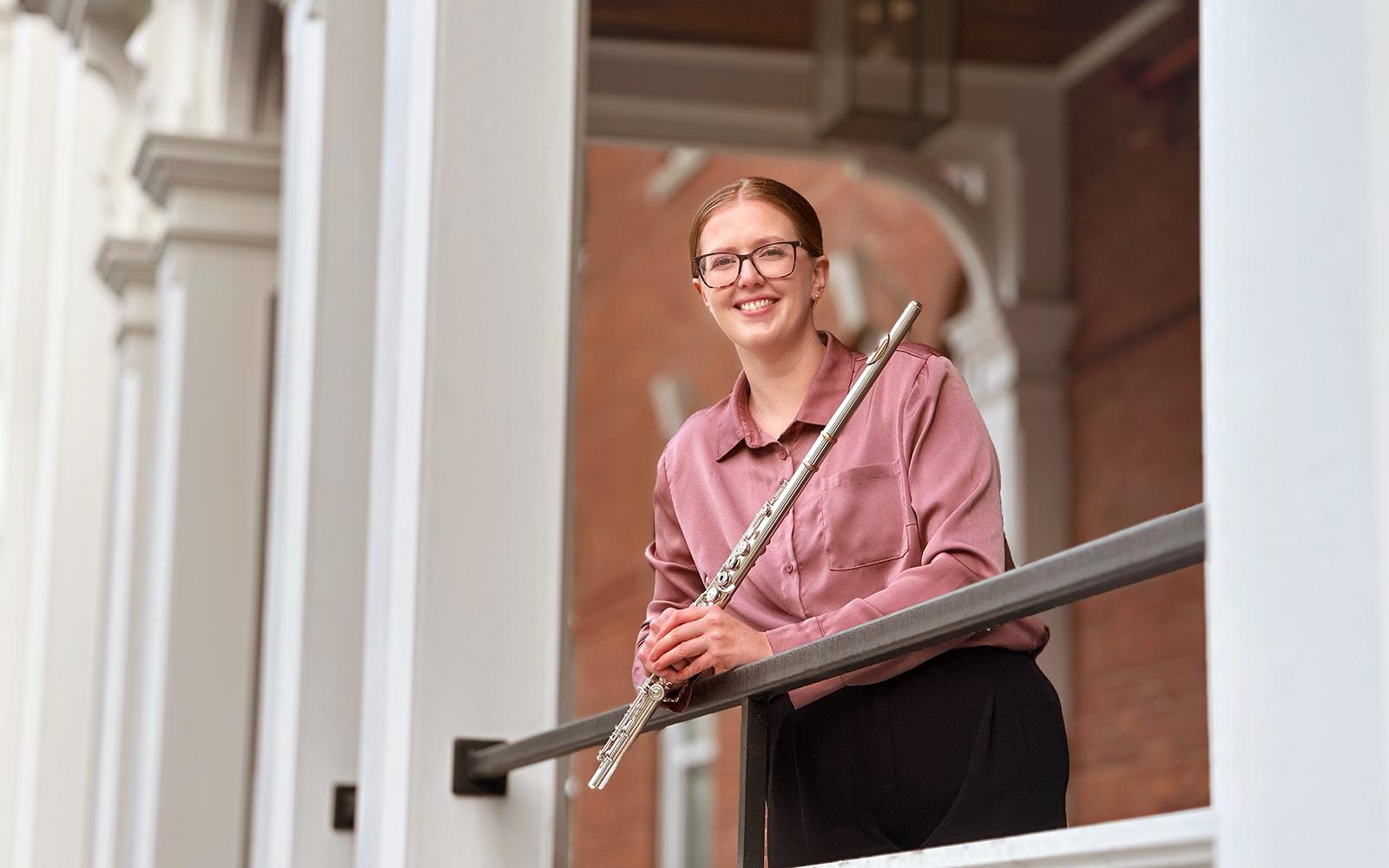A Crane alumna discovers relevance and connection just off her old doorstep
From National Guard duty to breathing new life into a school music program to building and keeping the sense of community that makes her never want to leave Vermont’s Northeast Kingdom, Emily Wiggett ’14 is a tireless beacon of Danville School.
Raised in Barton, Vt., just shy of the Canadian border, Wiggett descended from a line of dairy farmers who understood her creative values and hopeful arc without knowing the enrichment she would later bring back to her community. Upon graduation from SUNY Potsdam’s Crane School of Music with a dual degree in music education and music performance, the first thing Wiggett did was try to find a way home.
“There were not that many openings when I graduated, and I was nervous, but it worked out,” she recalled. “I was hired at Danville School, and I have never thought about leaving. It’s where my family is. We’re very close, and it’s a beautiful place to live.”
With flute as her primary instrument, Wiggett instructs large ensembles, project-based music labs, electives, and a modern rock band, where approximately 90 students in grades six to 12 learn not only musical principles but also problem-solving and resourcefulness.
“My goal for my students is musical independence,” she said. “I have so many kids whose first question is, ‘How does that go?’ Trying to give them tools and skills so they can figure out how it goes—without a teacher or a TikTok video—is the overall theme for all my students.”

In 2017, Wiggett received the Vermont Music Educators Association's Outstanding New Music Educator Award, aimed at bringing recognition to exceptional teachers in their first three years. The people who nominated her for the honor say she deserves credit for making the Danville School instrumental program a place where young people want to be. What’s more, youngsters following their ears into a world of music are always hungry for time with her.
“This past year, she sent a record number of students from Danville to the junior high and high school festivals,” one nominator wrote. “For the first time in recent memory, a Danville student was selected for the All-State Chorus. It’s clear that with Emily’s guidance, the music program will continue to expand and flourish.”
Graduating from “a tiny high school where everyone knew each other,” Wiggett looked to The Crane School of Music in search of a place and person with whom she could study flute. Never a fan of urban scenes, she found Potsdam to be as large of a place as she ever wanted to spend time. The generosity of spirit she encountered from storied flutist Kenneth Andrews, now a distinguished service professor emeritus at Crane, cemented her resolve to study there and nowhere else.
“I had a lesson with Mr. Andrews that was supposed to be an hour, and he took three hours out of his Saturday to work with me. That just felt like that was the best situation for me,” Wiggett said. “I felt like I wasn’t wasting his time. All the teachers were so kind and caring, and I was just certain I wanted to work with Mr. Andrews.”
Wiggett credits her student teaching experience with Crane’s Jill Rubio, a studio flute instructor, for inspiring her toward a career in teaching, and her fellow students for creating a community where she felt a sense of belonging.
"Mrs. Rubio is the epitome of what it means to be an educator-performer, and I wanted to follow in her footsteps. She encouraged me to uphold high standards of performance while being a highly skilled music educator," Wiggett said. “The studios were very close, and we were all good friends. Music school is very competitive, but we were all very supportive of one another. We played in each other’s recitals and helped each other with a lot of different projects. Being in ensembles, you get to bond on a different level. Music is very special in that way.”
To her own surprise, Wiggett also found a deep musical well with the Vermont Army National Guard, where she holds the rank of specialist in the 40th Army Band. Entering the Guard, she had to overcome her skepticism about her own age compared to younger peers, and grappled with reservations about whether the program would be a fit. Wiggett quickly found a home and was part of a quick reaction force that responded to catastrophic flooding in Vermont and coordinated with the Federal Emergency Management Agency during July 2023. In addition to a lesson in the unit’s importance during times of crisis, the Guard and its Army band have provided a profound musical experience across its various woodwind, brass, quintet and rock band venues.
“I’m wrapping up my third year and it’s been an incredible ride,” she said. “I’ve gotten better in so many different ways from learning from musicians who are better than me, and I’ve improved my skills as a music educator as well.”
It is impossible to spend time in Northern Vermont without feeling a timeless persistence of culture and a region’s flinty refusal to relinquish the better parts of itself, despite the rough economic turns it has experienced over the years. Every day, Wiggett contributes to this continuity, and along the way, she feels one of the most important emotions of all—a deep gratitude for her life and place.
“I’m fortunate to live here, have a great job, family, and two really sweet dogs,” she said. “I just really can’t complain.”
Article by Bret Yager. Photos by Jason Hunter
